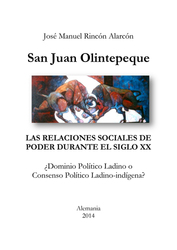| Departments | |
|---|---|
| Book Series (97) |
1382
|
| Nachhaltigkeit |
3
|
| Gesundheitswesen |
1
|
| Humanities |
2377
|
| Medienwissenschaften | 16 |
| Theology | 57 |
| Philosophy | 102 |
| Law | 424 |
| Economics | 855 |
| Social sciences | 418 |
| Sports science | 48 |
| Psychology | 233 |
| Educational science | 190 |
| History | 183 |
| Art | 111 |
| Cultural studies | 166 |
| Literary studies | 117 |
| Linguistics | 89 |
| Natural Sciences |
5408
|
| Engineering |
1798
|
| Common |
98
|
|
Leitlinien Unfallchirurgie
5. Auflage bestellen |
|
Advanced Search
Las relaciones sociales de poder durante el siglo XX (English shop)
¿Dominio político ladino o consenso político ladino-indígena?
José Manuel Rincón (Author)Preview
Extract, PDF (680 KB)
Table of Contents, PDF (630 KB)
Die vorliegende Arbeit untersucht die politischen Machtbeziehungen der Eliten der Indigenas und der Ladinos in der Gemeinde Olintepeque im Westen Guatemalas im 20. Jahrhundert. Vor dem Hintergrund der rassistischen Staatsideologie, die von der Kolonialzeit bis in die Gegenwart das Verhältnis der beiden Gruppen geprägt hat, hebt die Untersuchung die Notwendigkeit einer differenzierteren Betrachtung der vielfach postulierten politischen Vorherrschaft der Ladinos hervor. Basierend auf einer historischen Analyse, weist die Arbeit auf, dass das Verhältnis der Eliten in Olintepeque nicht von Dominanz-, sondern von Verhandlungsmechanismen und gegenseitiger Abhängigkeit geprägt war und für beide mit politischen als auch wirtschaftlichen Vorteilen verbunden waren. Die politische Machtaufteilung zwischen den Eliten der Ladinos und der Indigenas festigte gleichzeitig die Vorherrschaft beider über die Bevölkerungsmehrheit in Olintepeque und zerbrach erst Ende der 50er Jahre.
The thesis examines the political power relations by the Indigenous and Ladino elites in Olintepeque/ Western Guatemala in the 20th century. Against the background of the racist national ideology which has shaped the relationship between the two groups from colonial times till present, the investigation highlights the need for a more differentiated interpretation of the political relations between the two elites. Based on an historical analysis, the thesis demonstrates that the relationship between the Ladino and Indigenous elites in Olintepeque was not characterized by domination but instead by negotiation mechanisms and mutual dependence, with both elites benefiting from this arrangement. Their division of power consolidated the domination of both elites over the indigenous majority in Olintepeque and only came to an end in the mid-20th century.
| ISBN-13 (eBook) | 9783736984431 |
| Language | Spanish |
| Page Number | 577 |
| Edition | 1. |
| Publication Place | Göttingen |
| Place of Dissertation | Hannover |
| Publication Date | 2017-06-19 |
| General Categorization | Dissertation |
| Departments |
Social sciences
|
| Keywords | Indigenas, Ladinos, Olintepeque, Guatemala, Kolonialzeit, Eliten, politische Machtaufteilung, Indigenous, colonial times, elites, division of power |








